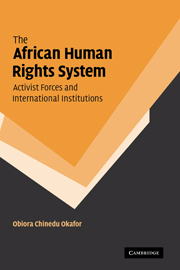Book contents
- Frontmatter
- Contents
- Acknowledgements
- List of abbreviations
- 1 The African human rights system, activist forces, and international institutions: an introduction
- 2 Conventional conceptions of international human rights institutions
- 3 Conventional conceptions of the African system for the promotion and protection of human and peoples' rights
- 4 The impact of the African system within Nigeria
- 5 The utilization of the African system within South Africa
- 6 Limited deployment of the African system within African states: further evidence and a general evaluation
- 7 Toward an extended measure of IHI effectiveness: a quasi-constructivist perspective
- 8 Conclusion
- Select Bibliography
- Index
5 - The utilization of the African system within South Africa
Published online by Cambridge University Press: 17 July 2009
- Frontmatter
- Contents
- Acknowledgements
- List of abbreviations
- 1 The African human rights system, activist forces, and international institutions: an introduction
- 2 Conventional conceptions of international human rights institutions
- 3 Conventional conceptions of the African system for the promotion and protection of human and peoples' rights
- 4 The impact of the African system within Nigeria
- 5 The utilization of the African system within South Africa
- 6 Limited deployment of the African system within African states: further evidence and a general evaluation
- 7 Toward an extended measure of IHI effectiveness: a quasi-constructivist perspective
- 8 Conclusion
- Select Bibliography
- Index
Summary
Introduction
In line with the conceptual and methodological approach that was adopted in the last chapter, the same kinds of issues that were raised in that context with regard to the impact of the African system within Nigeria also animate the discussion here. As the nature of those approaches and related issues have been discussed extensively in chapter 4 it will not be repeated here in any detail. What this chapter focuses on is the systematic examination and discussion of the available evidence relating to the impact of the African system within South Africa. Has this system impacted judicial reasoning and action, executive deliberations and action, legislative debate and action, and the work of civil society actors (CSAs) in South Africa? If so, to what extent has its impact been felt within these institutions and groups? What factors have facilitated or impeded this impact? Do the various processes via which this impact has been produced (what I have referred to elsewhere in this book as “correspondence”) differ from the “state compliance” which is traditionally focused upon in most of the literature? If so, how do they differ? What was the role of activist forces (such as some CSAs, judges, and MPs) in these processes in South Africa? What does the character of these other processes tell us about the adequacy or otherwise of the dominant state compliance measure and the way in which we evaluate and imagine international human rights institutions (IHIs)?
- Type
- Chapter
- Information
- Publisher: Cambridge University PressPrint publication year: 2007



